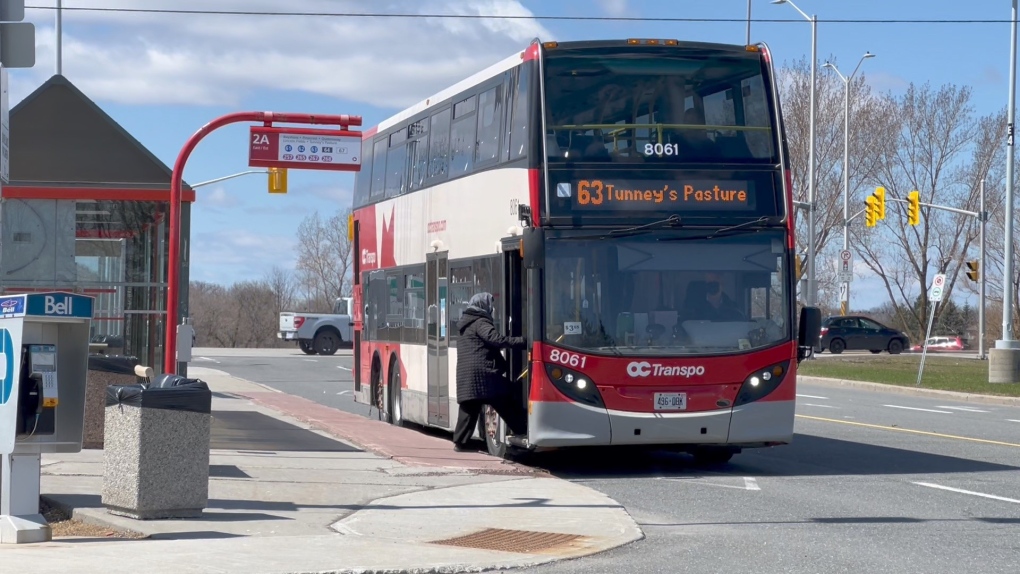OC Transpo ridership dips again after strongest month since pandemic began
 An OC Transpo bus at the Eagleson Park and Ride. (Dave Charbonneau/CTV News Ottawa)
An OC Transpo bus at the Eagleson Park and Ride. (Dave Charbonneau/CTV News Ottawa)
OC Transpo’s ridership dipped in October, a month after achieving its highest level since the start of the COVID-19 pandemic.
New numbers from OC Transpo show there were 5.6 million customer trips in October, 58 per cent of pre-pandemic levels. That’s down from 5.7 million in September, which was the highest figure since March 2020.
September ridership represented 64 per cent of pre-pandemic levels (the service originally said 63 per cent, but said Thursday it has revised that to 64 per cent after more information about U-Pass use).
In a memo to council on Thursday, transit general manager Renee Amilcar attributed the drop to reduced transit use among university students.
“Both uOttawa and Carleton University had their reading weeks in October, which decreased the trip rates for U-Pass holders,” she said. “As the U-Pass is prepaid for the entire semester, the reading weeks do not affect fare revenue.”
OC Transpo revenue was $11.7 million in October, down slightly from $11.8 million in September.
That figure is 44 per cent higher than in October 2021, but still below the forecasted fare revenue of $17.5 million in the 2022 budget.
But the ongoing ridership issues have transit advocates calling for an overhaul of the system.
“I think it’s time to have lots of options on the table,” Laura Shantz of Ottawa Transit Riders told CTV News. “Not everyone is travelling from the suburbs to a downtown office five days a week, and going in at rush hour and coming back in rush hour in the evening.”
“We need to think about other destinations that are important to our communities, and how we can provide that really good service that people need, that makes OC Transpo a first choice instead of a last choice.”
OC Transpo is projecting an $85 million deficit this year, largely due to lower-than-anticipated ridership. Earlier this week the Ford government pledged more than $63 million to help cover the deficit.
CTVNews.ca Top Stories

From outer space? Sask. farmers baffled after discovering strange wreckage in field
A family of fifth generation farmers from Ituna, Sask. are trying to find answers after discovering several strange objects lying on their land.
Broadcaster and commentator Rex Murphy dead at 77: National Post
The National Post is reporting that Rex Murphy, the pundit and columnist who hosted a national call-in radio show for decades, has died.
Pearson gold heist suspect arrested after flying into Toronto from India
Another suspect is in custody in connection with the gold heist at Toronto Pearson International Airport last year, police say.
Millions of cyberattacks per hour as B.C. government investigates multiple breaches
Careful attention to government statements and legislation is required to get a handle on the level of risk British Columbians’ information is under, as investigators probe multiple breaches under a continued barrage of attacks.
Ontario family receives massive hospital bill as part of LTC law, refuses to pay
A southwestern Ontario woman has received an $8,400 bill from a hospital in Windsor, Ont., after she refused to put her mother in a nursing home she hated -- and she says she has no intention of paying it.
Debate on abortion rights erupts on Parliament Hill, Poilievre vows he won't legislate
A Conservative government led by Pierre Poilievre would not legislate on, nor use the notwithstanding clause, on abortion, his office says, as anti-abortion protesters gather on Parliament Hill.
Justin and Hailey Bieber are expecting their first child together
Hailey and Justin Bieber are going to be parents. The couple announced the news on Thursday on Instagram, both sharing a video that showcases Hailey Bieber's growing belly.
Here are the ultraprocessed foods you most need to avoid, according to a 30-year study
Studies have shown that ultraprocessed foods can have a detrimental impact on health. But 30 years of research show they don’t all have the same impact.
New 'Lord of the Rings' film coming in 2026
The Oscar-winning team behind the nearly US$6 billion blockbuster 'Lord of the Rings' and 'The Hobbit' trilogies is reuniting to produce two new films.

































